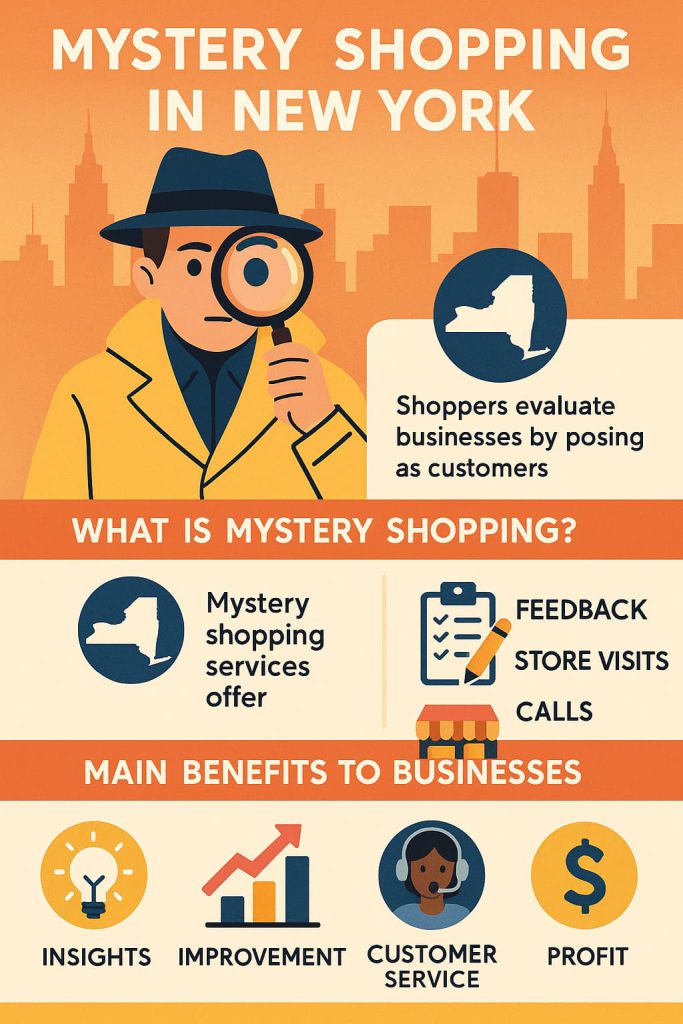Mystery Shopping in New York

The secret weapon separating thriving NYC businesses from those barely surviving? It’s hiding in plain sight.
While struggling entrepreneurs blame their location, the economy, or rising costs, market leaders are leveraging mystery shopping in New York to systematically dismantle their competition. This isn’t theoretical—it’s happening right now, block by block, across all five boroughs.
Consider this terrifying statistic: 96% of unhappy customers won’t vocalize their dissatisfaction. They simply vanish, forever. Mystery shopping in New York rips away the comfortable illusions business owners build around their customer experience, revealing the unfiltered truth that determines whether a business thrives or dies in America’s most ruthless marketplace.
Table of Contents
✅ Listen to this PODCAST EPISODE here:
What is Mystery Shopping?
Mystery shopping in New York captures what actually happens in the trenches. The good, the bad, and the bankruptcy-inducing ugly.
Mystery shopping in New York is your business’s reality check. It’s sending professionally trained evaluators to experience your business exactly as customers do—without the filters, without the performance, without the fake smiles when the boss walks by.
These aren’t random people with clipboards. They’re professional observers who document every painful detail of the customer journey with military precision.
The hard truth? Your employees don’t behave the same way when you’re watching. Obviously. They’re human.
What makes it powerful is its adaptability. Want to test how your team handles price objections from discount-hunting tourists? Need to see how consistently your baristas follow health protocols when they think nobody’s watching? Mystery shopping in New York creates custom scenarios that extract exactly the intelligence you need.
And unlike the dumpster fire of subjective Yelp reviews, mystery shopping delivers structured data you can actually build strategies around. Comparative scores. Trend analysis. Specific action items that transform frustrating patterns into profit-generating opportunities.
Why is Mystery Shopping Crucial in New York?
New York isn’t Iowa. Or California. Or anywhere else on the planet.
The competitive density here is suffocating. Within a three-block radius of your business, customers probably have 15+ alternatives. One mediocre experience and they’re gone. Forever.
Let’s talk money. Manhattan retail space averages $1,500+ per square foot. You’re bleeding cash every second a customer spends in your establishment without purchasing. Mystery shopping identifies exactly why browsers aren’t converting and why first-time buyers aren’t returning.
這 diversity factor multiplies everything. Your customers speak hundreds of languages and come from cultural backgrounds with wildly different service expectations. What delights one demographic might actively offend another. Mystery shopping in New York provides the granular cultural intelligence to navigate this minefield.
Then there’s the amplification nightmare. In a city packed with influencers and tastemakers, one spectacular service failure can spread fast. That single negative experience shared by someone with reach can trigger a six-figure reputation damage control operation.
Benefits of Mystery Shopping for Businesses

Mystery shopping in New York isn’t about catching employees doing something wrong. It’s about systematically eliminating the experience blindspots slowly killing your business.
Mystery shopping in New York delivers granular intelligence about specific interaction failures. When a West Village retailer discovered their associates excelled at product descriptions but consistently failed to offer complementary items, implementing targeted coaching increased attachment rates by 34% and average transaction value by $27.
Employee development accelerates dramatically when fueled by objective feedback. Management observations inevitably trigger performance changes—employees act differently when they know they’re being watched. Mystery shopping captures authentic interactions, creating breakthrough coaching opportunities. A Queens restaurant group used mystery shopping insights to create micro-training modules addressing specific service gaps, resulting in 31% higher customer satisfaction and a 17% increase in repeat visitation within one quarter.
Competitive intelligence becomes your strategic weapon. Beyond evaluating your own operations, mystery shopping in New York provides legal, ethical insights into competitor performance. Understanding precisely how rival businesses handle key customer scenarios helps calibrate your service standards.
The deepest impact is cultural transformation. When employees understand their performance is being objectively evaluated against clear standards, service consciousness becomes embedded in organizational DNA. The knowledge that any customer might be an evaluator naturally elevates performance standards. A Times Square attraction implementing quarterly mystery shopping saw overall customer satisfaction ratings improve 23% within six months—even in interactions that weren’t directly evaluated.
挑戰和考慮因素

Nothing worthwhile comes without obstacles.
Quality control mechanisms demand rigorous attention.
Not all evaluators deliver equal value—observation skills, reporting detail, and scenario believability vary dramatically.
The psychological dimension requires thoughtful navigation.
Some employees initially view mystery shopping as “corporate spying,” creating trust issues. Successful implementations frame the program transparently as a development tool rather than a punitive mechanism.
Implementation timing significantly affects results validity.
Launching during major holidays or staff transitions yields skewed findings. Strategic timing considers seasonal business fluctuations, recent operational changes, and staff stability.
Data interpretation frameworks prevent costly misunderstandings.
Isolated evaluations provide limited value—the real power emerges from trend analysis across multiple assessments. Develop systematic review processes that distinguish between individual performance issues and systemic operational challenges.
The Technology Revolution in Mystery Shopping
Mystery shopping in New York isn’t what it was five years ago. Hell, it’s not what it was five months ago. We’re witnessing a technological earthquake that’s obliterating traditional approaches and leaving dinosaur companies in the dust.
Remember when mystery shoppers scribbled notes in bathroom stalls? Those days are dead. Brutally murdered by mobile tech that’s transformed the entire evaluator game. Today’s professional shoppers wield sophisticated apps. These systems don’t just capture what happened. They document EVERYTHING. Timestamped photos. Audio snippets. Biometric data.
For instance, video mystery shopping has exploded across New York’s competitive landscape, and the footage doesn’t lie. A Brooklyn restaurant owner – whose team won three service awards last year – sat speechless watching video evidence of his celebrated front-of-house staff ignoring customers for nearly 5 minutes while gossiping among themselves. His exact words: “I’ve been living in a fantasy world.” The cameras capture what human memory conveniently forgets.
Waiting weeks for reports? Ancient history. Today’s systems trigger instant alerts when service failures occur.
Industry-Specific Mystery Shopping Applications

Generic mystery shopping is a complete waste of money. The market leaders crushing it in New York deploy laser-focused programs custom-built for their industry’s unique battlegrounds. The difference isn’t subtle – it’s the gap between domination and bankruptcy.
奢侈品零售: Mystery shopping in New York’s luxury sector obsesses over “clienteling” – the dark art of building customer relationships worth millions over time.
金融服務: Banks face a terrifying tightrope walk between compliance nightmares and soul-crushing customer experiences. Mystery shopping in New York‘s financial sector walks this razor’s edge, simultaneously hunting for regulatory violations and relationship-building failures.
款待: Hotels employ the most comprehensive mystery shopping in New York, with evaluators living the complete guest experience across multiple nights.
衛生保健: Think mystery shopping doesn’t work in medicine? Dead wrong. Mount Sinai deployed specialized evaluators to assess both clinical and administrative experiences. The findings were jaw-dropping: patients who saw doctors before lunch received 42% more thorough explanations than afternoon patients. Morning patients got comprehensive care. Afternoon patients got rushed. Same doctors. Same prices. Wildly different value. This discovery triggered standardized communication protocols and schedule restructuring that eliminated the quality gap that was invisibly destroying patient trust.
房地產: Think you know what’s killing your closing rates? You don’t. A Manhattan property management firm was stunned when mystery shopping exposed their leasing agents showcasing only 40% of property amenities to prospective tenants. They were literally hiding 60% of their property’s value from potential renters! Correcting this blindspot increased closing rates by 22% while justifying premium rents based on amenities that were there all along. They were leaving millions on the table for years.
運輸: Mystery shopping ruthlessly evaluates every element from vehicle cleanliness to driver knowledge.
The Psychology Behind Successful Mystery Shopping Programs
Want to know why 90% of mystery shopping programs crash and burn? It’s not the evaluation questions. Not even the shoppers. It’s the psychology.
The foundation everything else stands on? The Hawthorne Effect – the scientifically proven reality that humans radically change behavior when they know they’re being watched. Traditional management inspections are laughably ineffective because they trigger temporary performance spikes that vanish the second the boss leaves. Mystery shopping in New York demolishes this pattern by creating what behavioral economists call “accountability ambiguity” – your team knows evaluation might happen during ANY interaction but never knows WHICH customers are evaluators. This perpetual uncertainty doesn’t just elevate performance temporarily – it rewires behavioral patterns permanently.
On the other hand, social proof might be the most underutilized psychological weapon in the mystery shopping arsenal. When employees witness peers receiving recognition for specific behaviors, it creates contagious modeling effects more powerful than any management directive. The market leaders in New York publicly spotlight mystery shopping victories rather than privately punishing failures.
The endowment effect – we value what we help create – explains why forcing mystery shopping programs down employees’ throats guarantees resistance. When staff help establish evaluation criteria, psychological ownership transforms mystery shopping from invasive surveillance to welcomed feedback.
When you grasp these psychological principles, mystery shopping in New York transforms from expensive measurement tool to behavioral catalyst that rewires your entire organizational DNA.
Training Your Team to Thrive Under Mystery Shopping
Most mystery shopping rollouts create panic, paranoia, and employee rebellion. Why? Because management screws up the implementation so spectacularly it’s almost impressive.
The difference between programs that transform teams and those that trigger mass resignations comes down to one factor: preparation.
Mystery shopping in New York fails spectacularly when leadership hides behind corporate talk about “routine assessment.” Your team isn’t stupid. They know when they’re being watched. So, before unleashing mystery shoppers, run practice scenarios. Lots of them. With immediate feedback.
The most sophisticated operators don’t focus on helping staff perform well during evaluations – they build evaluation-proof service systems. Connect mystery shopping directly to rewards people actually care about.
The ultimate goal is creating a culture where mystery shopping in New York becomes an anticipated growth catalyst rather than dreaded judgment day.

Key Insights Summary
✅ Mystery shopping in New York strips away the comfortable illusions about your customer experience, revealing the unfiltered reality that determines your business survival in America’s most competitive marketplace.
✅New York’s uniquely brutal environment—characterized by astronomical real estate costs, extreme customer diversity, ruthless competition, and social media amplification—makes mystery shopping essential for financial survival.
✅Leading providers deliver specialized methodologies ranging from luxury-focused evaluations to technology-enhanced assessments capturing the entire customer experience ecosystem.
• Professional mystery shoppers develop systematic observation techniques, strategic assignment selection, and geographic clustering to maximize effectiveness and earning potential.
✅ Businesses leverage mystery shopping intelligence to transform customer service, accelerate employee development, gather competitive intelligence, and drive measurable financial returns.
✅ Implementation challenges include financial investment, quality control, psychological resistance, strategic timing, and data interpretation—all requiring direct confrontation.
What Makes SIS International a Top Mystery Shopping Provider?
CUSTOMIZED APPROACH
Forget cookie-cutter evaluations that deliver generic insights. SIS國際 architects bespoke intelligence operations tailored to your specific competitive challenges. Our proprietary scenario development process creates evaluation experiences that precisely mirror your most crucial customer journeys, not generic interactions.
THE 40+ YEARS OF EXPERIENCE
While competitors learn through trial and error, SIS International’s four decades of market intelligence expertise inform every aspect of their methodology. Our senior analysts have seen literally everything, bringing pattern recognition that contextualizes your results against broader market trends and emerging customer expectations.
THE GLOBAL DATABASES FOR THE RECRUITMENT
SIS International maintains New York’s most demographically diverse evaluator network, ensuring precise matching to your target customer profiles. Our evaluators undergo brutal screening and certification processes, with less than 18% of applicants qualifying for their elite assessment team.
PROJECTS GET DONE FAST
While competitors take weeks, SIS International’s proprietary methodology delivers actionable intelligence within days—sometimes hours. Our integrated technology platform enables real-time data transmission from field evaluators to analysts, eliminating traditional reporting delays.
AFFORDABLE RESEARCH
SIS International’s modular approach creates right-sized programs for businesses of every scale, from single-location operations to multi-site enterprises. Our progressive implementation model allows starting with focused evaluations of critical touchpoints before expanding to comprehensive assessment.
MARKET RESEARCH INTEGRATION
We contextualize mystery shopping within broader market intelligence operations. Our integrated approach correlates mystery shopping findings with quantitative survey data, competitive analysis, and market positioning research.
常見問題解答
Can mystery shopping really improve our bottom line?
Mystery shopping in New York impacts your financials through multiple pathways simultaneously: increasing conversion rates (turning more browsers into buyers), elevating average transaction values (through improved suggestive selling), enhancing customer retention (by eliminating experience friction), and optimizing operational efficiency (by identifying process bottlenecks).
How do we prevent employees from identifying mystery shoppers?
Sophisticated mystery shopping employs multiple countermeasures simultaneously: deploying demographically diverse evaluators matching your natural customer mix, varying evaluation timing to prevent predictability, utilizing scenario rotation to eliminate pattern recognition, and employing evaluators with professional backgrounds in fields requiring undercover work.
What’s the difference between mystery shopping and customer surveys?
They capture fundamentally different realities. Customer surveys collect self-reported opinions from individuals who choose to respond—typically representing the extremes (delighted or furious customers). Mystery shopping in New York delivers structured, objective evaluation of specific service elements from professional observers following predetermined scenarios. Surveys tell you how customers feel about their experience, while mystery shopping documents what actually happened during interactions. The combination provides multidimensional intelligence: surveys reveal perception patterns while mystery shopping identifies the specific operational realities creating those perceptions. Stop choosing between them—implement both.
How frequently should we conduct mystery shops?
Most New York businesses find monthly evaluations provide sufficient trend visibility while maintaining cost-effectiveness. But consider accelerated frequency during critical periods: following service redesigns, after staff training initiatives, during seasonal peaks, or when addressing specific performance challenges.
Can mystery shopping evaluate online as well as in-person experiences?
Modern mystery shopping extends far beyond physical interactions to assess your entire customer experience ecosystem. Digital evaluation includes website usability testing, e-commerce transaction assessment, chat support evaluation, social media response monitoring, and cross-channel consistency verification. As customer journeys increasingly blend physical and digital touchpoints, comprehensive programs evaluate this entire continuum to identify friction in channel transitions.
How do we implement findings without damaging employee morale?
Stop tiptoeing around performance issues. Strategic implementation transforms mystery shopping from perceived threat to valued development tool. Start with transparent communication—explain the program’s purpose, methodology, and how findings will be used before implementation.
Establish clear separation between individual coaching opportunities and systemic operational issues requiring structural changes. Celebrate successes loudly through recognition programs tied to mystery shopping results. Involve employees in establishing evaluation criteria to build ownership. And critically, demonstrate responsive action on identified issues—when employees see mystery shopping driving meaningful improvements to their work environment, resistance typically transforms into engagement.
我們在紐約的工廠位置
11 E 22nd Street, Floor 2, 紐約, NY 10010 電話:+1(212) 505-6805
關於 SIS 國際
SIS國際 提供定量、定性和策略研究。我們為決策提供數據、工具、策略、報告和見解。我們也進行訪談、調查、焦點小組和其他市場研究方法和途徑。 聯絡我們 為您的下一個市場研究項目。

